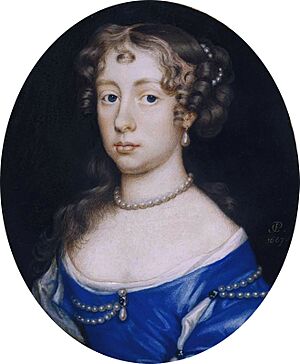Philip Stanhope, 2nd Earl of Chesterfield facts for kids
Philip Stanhope, 2nd Earl of Chesterfield (born 1634 – died 28 January 1714) was an important person in the English nobility. He was a member of the House of Lords, which is part of the British Parliament.
About His Life
Philip Stanhope was the son of Henry Stanhope, Lord Stanhope, and Katherine Wotton. When his grandfather passed away in 1656, Philip became the Earl of Chesterfield.
He went to school in Leyden and Breda, which are cities in the Netherlands. In 1669, he earned a special degree called Doctor of Civil Laws from the University of Oxford.
Philip Stanhope was married three times. His first wife was Lady Anne Percy. After she died, he was supposed to marry Mary Fairfax. However, Mary decided to marry the 2nd Duke of Buckingham instead. Philip then married Elizabeth Butler. They had one daughter named Lady Elizabeth. Later, he married Lady Elizabeth Dormer, and they had two sons.
Philip Stanhope faced some challenges in his life. He was held in the Tower of London for a short time after being involved in a duel in 1658. A duel was a formal fight between two people, often with weapons. He was also suspected of being involved in a rebellion in 1659. After some time, he received a pardon from King Charles II and returned to England.
His Work and Roles
Philip Stanhope had several important jobs during his life. From 1662 to 1665, he was the Lord Chamberlain to Queen Catherine of Braganza, who was King Charles II's wife. This meant he was in charge of the Queen's household. He was also a member of her Council in 1670.
He served as a Colonel in a foot regiment (a type of army unit) in 1667 and 1682. In 1681, he became a Privy Councillor, which meant he advised the King. He was also the Warden of the royal forests south of the Trent River starting in 1679.
In 1708, he was chosen to be a Fellow of the Royal Society, a famous group that promotes science. Philip Stanhope passed away at his home in Middlesex and was buried in Shelford, Nottinghamshire.
See also
| Legal offices
|
||
|---|---|---|
| Preceded by The Duke of Monmouth |
Justice in Eyre south of the Trent 1679–bef. 1686 |
Succeeded by The Earl of Huntingdon |
| Military offices
|
||
| Preceded by The Earl of Mulgrave |
Colonel of The Holland Regiment 1682–1684 |
Succeeded by The Earl of Mulgrave |
| Peerage of England | ||
| Preceded by Philip Stanhope |
Earl of Chesterfield 1656–1714 |
Succeeded by Philip Stanhope |
Images for kids
 | Frances Mary Albrier |
 | Whitney Young |
 | Muhammad Ali |



